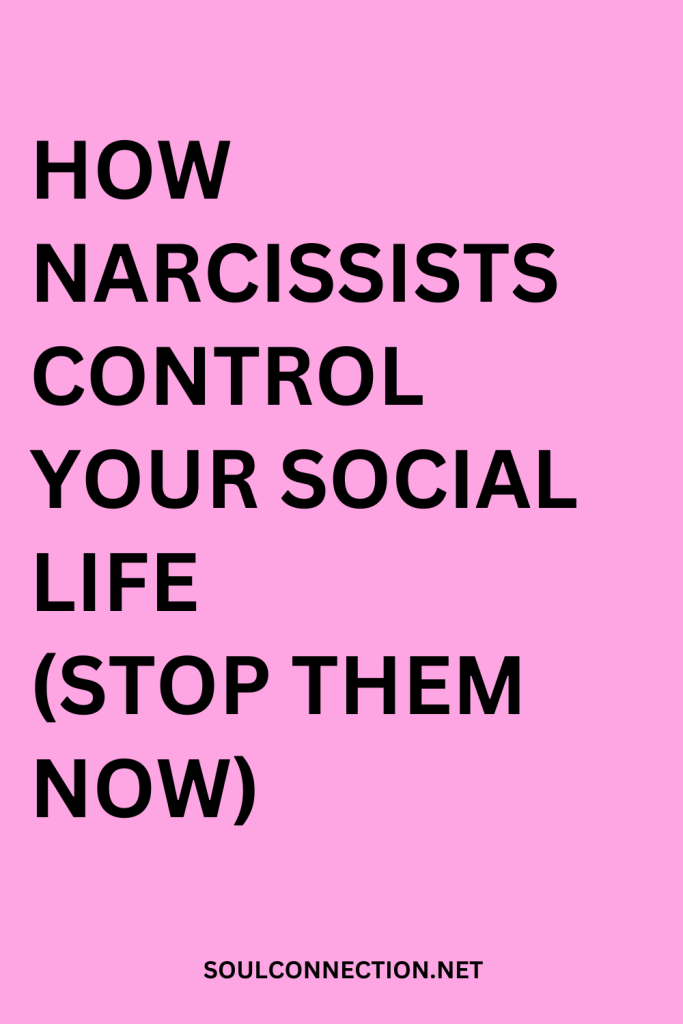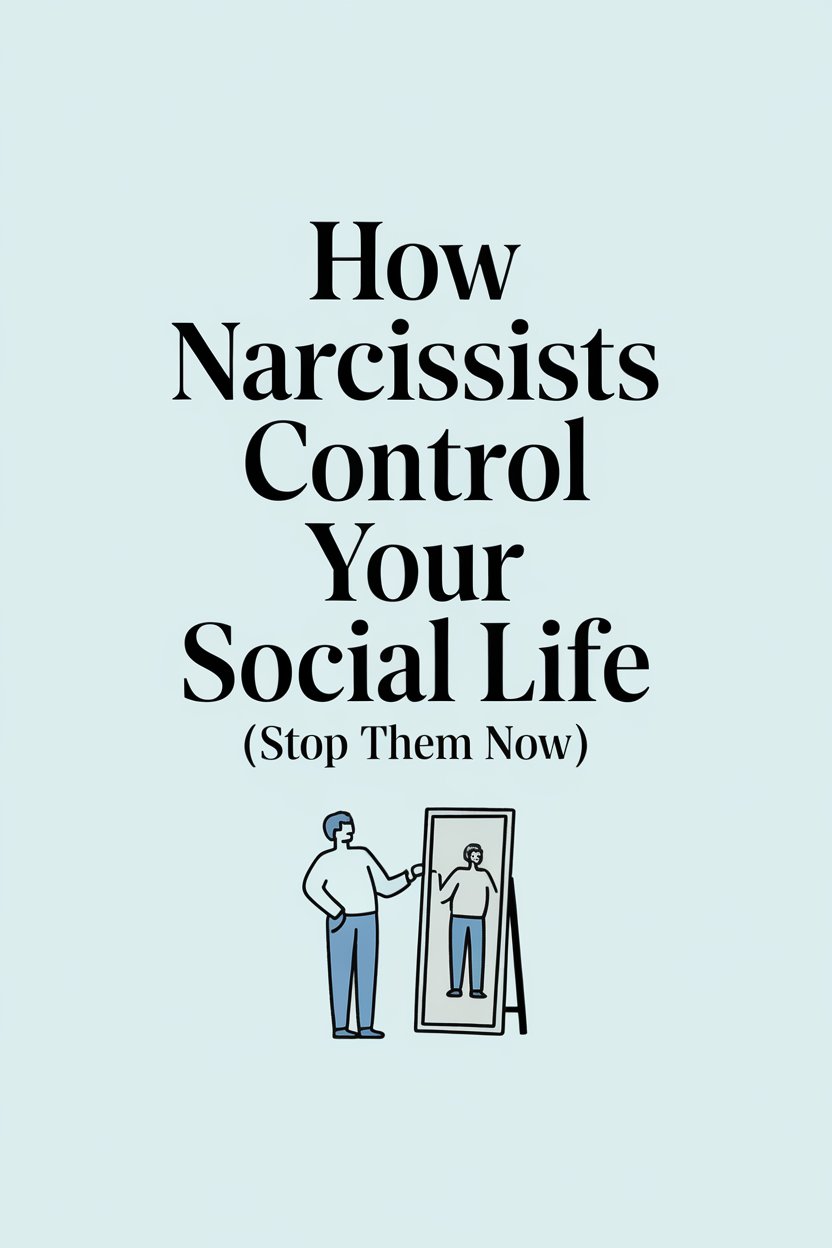Spotting a narcissist in your social circle is a bit like noticing a raccoon in your kitchen. At first, you might think, “Surely, I’m imagining things.” But then, the chaos begins.
Suddenly, you’re left cleaning up the aftermath and wondering when you lost control of your own house.
If you’ve found your friendships, family connections, or even your Friday nights whittled away until you’re left with nothing but the narcissist’s shadow, it’s time for a reality check—and a plan to take your life back.
The Subtle Art of Isolation
A narcissist rarely starts with the dramatic. They’re far more likely to slip in through the cracks with subtle suggestions and offhand comments.
“Your friends don’t really get you, do they?” “I just feel like your family doesn’t appreciate how happy I make you.”
It might sound gentle, even loving, at first. But give it time. What starts as “meant only for you” slowly turns into “meant only for us.”
The narcissist’s main goal is to cut you off from your support system. They want to be the sole voice in your life, the only one to validate or criticize, the all-powerful judge and jury of your self-worth.
It’s not about love. It’s about control.
Ever notice how you start declining invites or making excuses for why you can’t catch up with friends? This is no coincidence; it’s stage one of the social squeeze. The narcissist wants you alone, in their orbit, spinning dizzy.
The Game of Divide and Conquer
No narcissist worth their salt skips this step. It’s classic playground politics, only everyone’s grown up and the stakes are your sanity.
The narcissist plants tiny seeds of doubt in your relationships, pitting people against each other or against you.
“Did you hear what your best mate said about you?”
“She told me she’s worried you’re making bad choices.”
They’ll stir the pot, then act wide-eyed and innocent as it boils over. Meanwhile, you’re left second-guessing every interaction, wondering who’s really on your side.
If you find yourself suddenly wary of those you trusted, ask yourself: Who benefits from you being suspicious?
Their endgame? To become your only confidante—the keeper of all secrets, the solver of all problems. Except, of course, most of those problems are ones they’ve created.
Manipulating the Narrative
Reality is a flexible concept in the narcissist’s world. If you catch them in a lie, they didn’t lie. You misheard.
If an event happened, well, it didn’t happen like that. Or it didn’t matter. Or you’re too sensitive.
This rewriting of facts extends to your social life. They’ll tell friends and family a version of events that casts them as the misunderstood hero and you as the unstable villain.
Suddenly, people pull away, unsure of what to believe.
If you’ve been left scratching your head at a friend’s cold shoulder or a relative’s odd behaviour, there’s a good chance the narcissist’s been whispering in their ear.
Step one: Don’t panic. Step two: Take note of what’s being said, and by whom. Truth has a nasty habit of resurfacing, especially when you keep your own receipts.
Social Sabotage in Disguise
Imagine you’ve just been invited to your best friend’s birthday bash. Suddenly, the narcissist is struck by a suspicious illness. Or maybe they plan an “urgent” event at the same time.
If that doesn’t work, they’ll find a way to make you feel guilty for even considering going.
“They’d never be there for you like I am.”
“This is the one night I needed you, and you want to leave me alone?”
It’s a guilt trip with no return ticket. Over time, you start anticipating their reaction and decline the invite without even mentioning it.
That’s exactly what they want: you, alone, their plans front and center, your own relationships gathering dust.
Spying and Snooping
A narcissist’s favourite hobby? Surveillance. And no, it’s not just scrolling past your ex’s questionable Facebook photos (though they’ll do that, too). T
hey want to know who you’re texting, what you’re saying, and when you’re meeting anyone outside their realm of influence.
They may demand full access to your phone, “just for honesty’s sake.” Or insist on tagging along to every social event, even those that have “girls’ night” or “lads only” written all over them.
If you push back, they’ll accuse you of hiding something.
Meanwhile, your ability to have open, private conversations with anyone—family, friends, colleagues—evaporates. There’s always an audience. And every interaction is up for review.
Love Bombing and Withholding
Narcissists are masters of hot and cold. One moment, you’re the star of their universe, showered with attention and affection. The next, they’re icy, distant, or outright dismissive.
This isn’t random moodiness; it’s a calculated system.
If you do as they please—cut off a friend, skip a gathering, prioritize their needs—they “reward” you with affection. Step out of line, and the cold shoulder arrives faster than next-day delivery.
Over time, your brain starts associating isolation with love and connection with punishment.
It’s a training exercise, and you’re the one being housebroken.
Gaslighting Your Social Reality
Ever walked away from an argument feeling like you’ve lost your mind? That’s gaslighting at work.
Narcissists use this trick to convince you your concerns are baseless, that you’re overreacting, or that the people you care about are the real problem.
You might voice a worry about losing friends, only to hear, “You’re just too sensitive. No one is cutting you off except you.” Before long, you start doubting your own memory, instincts, and even your sanity.
Trust me, you’re not losing the plot. They’re just working overtime to make sure you don’t trust your own judgment.
Weaponizing Social Media
Ah, social media—the narcissist’s playground. Here, they can curate the perfect image: the devoted partner, the adored friend, the all-around legend.
You? You might get left out of the highlight reel or, worse, featured in cryptic posts that paint you as the villain.
They’ll monitor your tags, question every new friend request, and demand explanations for every laugh emoji. If you post a photo with friends, they’ll interrogate you about who was there and what you talked about.
Privacy settings become a battleground. And your online presence? Heavily policed territory.
Turning Allies into Flying Monkeys
Remember those friends and family members who used to have your back? Suddenly, they’re relaying the narcissist’s messages, urging you to “work things out” or “consider their feelings.”
Congratulations: you’ve encountered the flying monkeys.
A narcissist enlists these unwitting helpers to do their bidding, spreading their version of events and pressuring you to conform. Rather than confronting you directly, they pull back and let the monkeys do the dirty work.
This is classic manipulation with a group project twist. If you notice a sudden chorus of voices all echoing the narcissist’s concerns, you’re probably not imagining it.
How to Stop the Control Tonight
Here’s the good news: you’re not powerless in this circus. Far from it. Even if your social world feels like it’s shrunk to the size of a shoebox, you can start taking back your freedom—tonight.
Start reconnecting. Call or text the friend you haven’t seen in ages. Arrange a quick coffee or even a Zoom chat. You don’t need permission, and you definitely don’t need to explain yourself.
Draw clear boundaries. “No, you can’t read my messages.” “No, I’m not skipping my sister’s birthday.” Practice saying no without a long explanation. If you get pushback, you’re on the right track.
Keep receipts. Document conversations where your words (or reality) are twisted. Save messages, jot down dates, or just keep a mental file of inconsistencies. Your sanity will thank you.
Don’t take the bait. When the guilt-trip arrives, recognize it for what it is—a manipulation technique, not a genuine plea. You’re allowed to put your own needs first.
Reach out for support. Reconnect with those who care about you. If friends or family have drifted, send a message. Chances are, they’ve noticed something’s off, too.
Protect your privacy. Change passwords, adjust social media settings, and take back your digital life. Your phone is yours. Your conversations are yours.
Talk to a professional. Therapy isn’t just for “big” problems. Sometimes, just having a neutral third party validate your experience is a game-changer.
Reclaiming Your Social Life
Narcissists thrive on control, secrecy, and isolation. They don’t want you to have allies, opinions, or a life outside their carefully constructed bubble.
But here’s the twist: their power depends on your compliance. The second you start pushing back—even a little—that house of cards starts shaking.
Your friends are still out there. Your family still cares, even if things got complicated for a while.
And your sense of self? It’s waiting patiently for you to pick it up, dust it off, and put it back on display.
You’re not being difficult. You’re not overreacting. You’re taking your life back, one coffee catch-up and boundary at a time.
If the narcissist in your life can’t handle the new you, that’s their problem, not yours. The control stops now.


